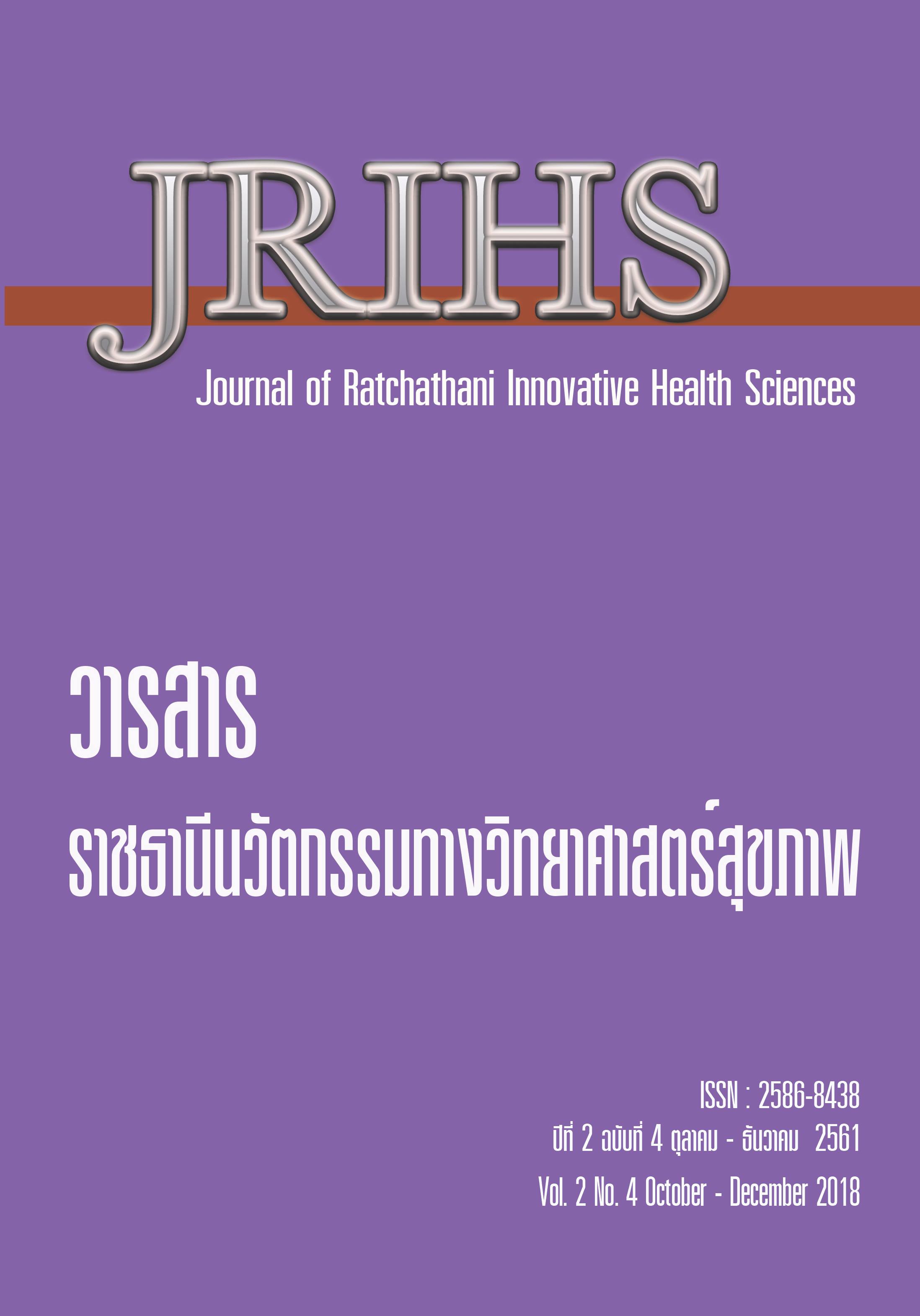Application of The WHO’s Innovative Care for Chronic Conditions Framework for Diabetes Prevention According to The Role of Professional Nurses in Primary Health Care System
Main Article Content
Abstract
Chronic diseases are a major problem of public health around the world, including Thailand. The WHO’s Innovative Care for Chronic Conditions Framework (ICCC) is a model of care that the World Health Organization developed to suit the context of various countries and to achieve better health outcomes for chronic disease patients. This model consists 3 levels of care management, including individuals and families, health service organization and community, and policy level. The implementation of WHO’s Innovative Care for Chronic Conditions Framework for making better outcome of chronic disease management in the north of Thailand by role’s professional nurses as advocacy role, health educator role, Health Care Provider Role and co-coordinator role.
Article Details
ความคิดเห็นและข้อเสนอแนะใดๆ ที่นำเสนอในบทความเป็นของผู้เขียนแต่เพียงผู้เดียว โดยบรรณาธิการ กองบรรณาธิการ และคณะกรรมการวารสารราชธานีนวัตกรรมทางวิทยาศาสตร์สุขภาพไม่ได้มีส่วนเกี่ยวข้องแต่อย่างใด มหาวิทยาลัยราชธานี บรรณาธิการ และกองบรรณาธิการจะไม่รับผิดชอบต่อข้อผิดพลาดหรือผลที่เกิดขึ้น จากการใช้ข้อมูลที่ปรากฏในวารสารฉบับนี้
References
ชณิตา ประดิษฐ์สถาพร. (2559). การพัฒนาระบบสุขภาพชุมชนด้านการป้องกันเบาหวานด้วยอาหารวิถีล้านนา: ประมวลบทความวิชาการ. พันธกิจสัมพันธ์มหาวิทยาลัยกับสังคม สำนักงานกองทุนสนับสนุนการวิจัย.
พเยาว์ ผ่อนสุข และสิรินทร์ยา พูลเกิด. (2561). การศึกษาประสิทธิภาพ และความคุ้มทุนทาง เศรษฐศาสตร์ของมาตรการลดการบริโภคโซเดียมโดยใช้โปรแกรม One Health Tool. แผนงานวิจัยนโยบายอาหารและโภชนาการ เพื่อการสร้างเสริมสุขภาพ. สืบค้นจาก http://www.fhpprogram.org/media/pdfs/reports/0188923f8632a5d36c0914f17dd53a0e.pdf
มณฑิชา รักศิลป์. (2561). ต้นทุนประสิทธิผลของโปรแกรมสร้างเสริมสุขภาพร่วมกับการใช้กลุ่ม ช่วยเหลือตนเองเพื่อป้องกันโรคอ้วนในอาสาสมัครสาธารณสุขประจำหมู่บ้าน อำเภอเลิกนกทา จังหวัดยโสธร. วารสารการพยาบาล และการดูแลสุขภาพ, 36(3), 127-136.
วิชัย เอกพลกร และคณะ. (2559). การสำรวจสุขภาพประชาชนไทยโดยการตรวจร่างกายครั้งที่ 5 พ.ศ.2557. กรุงเทพฯ: อักษรกราฟฟิคแอนด์ดีไซน์.
สุทธีพร มูลศาสตร์, ชมนาด พจนามาตร์ และนิชธาวัลย์ ถาวร. (2560). การจัดการการดูแลผู้ป่วยโรคไม่ติดต่อเรื้อรังในชุมชนที่มีความหลากหลายวัฒนธรรม เขตพื้นที่ชายแดนภาคเหนือของประเทศไทย. วารสารพยาบาลสาธารณสุข, 31(1), 145-161.
สุพัตรา ศรีวณิชชากร. (2560). สถานการณ์การป่วยและตายด้วยโรคไม่ติดต่อเรื้อรัง (โรคเบาหวานชนิดที่ 2) ในประเทศไทยระยะ 5 ปี (2553-2557). วารสารควบคุมโรค, 43(4), 379-391.
Barr, V.J., Robinson, S., Marin-Link, B., Underhill, L. & Dotts, A. (2003). The Expanded Chronic Care Model: An integration of concepts and strategies from population health promotion and Chronic Care Model. Healthcare Quarterly, 7(1)73-82. doi:10.12927/hcq.2003.16763
Department of Non-Communicable Disease. (2017). Annual report 2017. Bangkok: Ausorn Graphic Publishing House.
Ekpenyon, C.E. (2019). Relationship between Insulin Resistance and Metabolic Syndrome Clusters: Current Knowledge. ACTA SCIENTIFIC MEDICAL SCIENCES, 3(3), 99-104.
Jaspers, L., Colpani, V., Chaker, L. Van der Lee, S.J., Muka, T., Imo, D., Mendis, S., Franco, O.H. (2015). The global impact of non-communicable diseases on households and impoverishment: A systematic review. Eur J Epidemiol, 30, 163–188. DOI 10.1007/s10654-014-9983-3.
Lyra, R., Silva, R.D.S., Junior, R.M.M., Matos, M.V.C., Cezar, N.J.B., Fernandes, V.O., et al. (2012). High prevalence in Brazilian Northeast population of low education and income level, ang its association with obesity and metabolic syndrome. Assoc Med, 58, 209-14.
Pan American Health Organization. (2013). Innovative Care for Chronic Conditions: Organizing and delivering high quality care for chronic noncommunicable diseases in the Americas. Washington: Pan American Health Organization.
Weihua, X., Minghui, T., & Yanju, Z. (2018). The relationship between insulin resistance, adiponectin and C-reactive protein and vascular endothelial injury in diabetic patients with coronary heart disease. Exp Ther Med, 16(3), 2022-2026.
Wagner, E.H., Austin, B.T., Davis, C., Hindmarsh, M., Schaefer, J. & Bonomi, A. (2001). Improving chronic illness care: Translating evidence into action. Health Aff (Millwood), 20(6), 64-78.
World Health Organization. (2018). Noncommunicable diseases country profiles 2018.Geneva: World Health Organization.Retrieved from
https://www.who.int/nmh/publications/ncd-profiles-2018/en/


